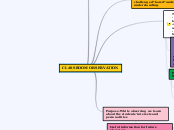CLASSROOM OBSERVATION
IMPORTANT ROLE IN PRACTICE TEACHING:
OBSERVING THE COOPERATIVE TEACHER:

HOW SHE TEACHES
THE ATMOSPHERE SHE CREATES
THE RESOURCES USED
STRATEGIES
EXPLANATIONS
INSTRUCTIONS
INTERACTION
AS OBSERVERS WE MAY BE ASKED TO OBSERVE MORE THOROUGHLY:
*Lesson structure.
*Number of activities.
*Management strategies.
(setting of groups, timing)
TEACHING IS A COMPLEX ACTIVITY:
*Students respond differently:* challenged *bored*unclear- clear understanding.

Reflection upon observation is needed
The observer presence has its effect:
- the cooperative teacher may be less natural as usual.
-as novate teachers we may feel tense while observed.
- it may be distracting for the trainee.

The observer will be mindful of our teaching skills and overall domain of the situation.
Strengths and weaknesses will be assessed.
FEEDBACK on your work will be provided.
In comfortable working relationships the LEARNING EXPERIENCE CAN BE POSITIVE
The supervisor will help the trainee to monitor their practice better.
Dialogue is vital.
PERSONALITY AND EXPERIENCE WILL SHAPE OUR CLASSROOM TOO.
" Classroom Culture"; set of values and general rules that take place.
Kind of language
Purpose: While observing we learn about the students' interests and personalities
Useful information for future planning:
LEARNING STYLES

READING

WRITING

EXPERIENCING

LISTENING

SPEAKING

CREATIVITY
